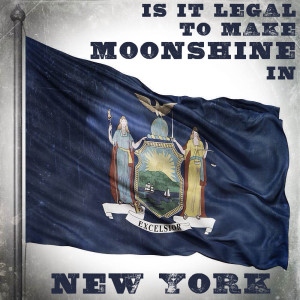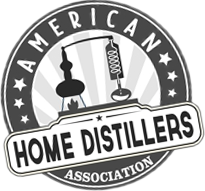Home Distilling Laws: Is It Illegal to Make Moonshine in New York?
 The following questions will be answered in this article:
The following questions will be answered in this article:
- Is it legal to own an still in New York?
- What is the legal penalty for owning an unauthorized still in New York?
- Is it legal to make moonshine in New York?
- Is a Permit Available to Make Alcohol For Consumption?
- What Is the Penalty for Selling Illegally Produced Alcohol in New York?
- Is a fuel alcohol permit available in New York?
Is it Legal to Own a Still in New York?
- The answer to this question depends on a few things. How big is the still, what is being used for, and does the individual who owns it also have federal permits? Here’s what the law says. New York Alcoholic Beverage Control Law Article 10 Section 153 provides that, “ Any person who shall manufacture any illicit alcoholic beverage or who, not being duly licensed as a distiller under the provisions of the alcoholic beverage control law, shall own, operate, possesses or have under his control any still or distilling apparatus is guilty of a felony.” This first section says that if you own a still and don’t have state and federal permits to make alcohol, you’re guilty of a felony.
- The document goes on to say that a “still” or a “distilling apparatus” is defined as “any apparatus designed, intended, actually used, or capable of being used for or in connection with the separating of alcoholic or spirituous vapors, or alcohol or spirituous solutions, or alcohol or spirits, from alcohol or spirituous solutions or mixtures, but shall not include stills used for laboratory purposes or stills used for distilling water or other nonalcoholic materials where the cubic capacity of such stills is one gallon or less.” This is a reference to federal statutes that declare stills with a capacity of 1 gallon or less, that aren’t being used to make shine, are legal and are unregulated.
- The interesting thing is that the document goes on to read that “… it shall not be unlawful for any person to own, possess or have under his control any still or distilling apparatus (a) where the same has been duly registered in compliance with or has otherwise complied with the provisions of Federal law and regulations issued pursuant thereto, or (b) where the same is not required to be registered under Federal law, or (c) where the same is in the possession of a duly qualified manufacturer of stills under Federal law…”. If a person has a non-producing still not used, or intended, for alcohol production such that it is not required to be registered under the Federal law, then it is not illegal to possess it in New York. Federal law does not prohibit owning a still for the purpose of distilling water, regardless of size. This means that if an individual has a federal fuel alcohol permit, owning a still of any size is legal. This language also appears to suggest that a still of any size, used for purposes other than distilling alcohol, is legal.
Legal to own a non-producing still?
- Yes. New York Alcoholic Beverage Control Law Article 10 Section 153 provides that, “ Any person who shall manufacture any illicit alcoholic beverage or who, not being duly licensed as a distiller under the provisions of the alcoholic beverage control law, shall own, operate, possesses or have under his control any still or distilling apparatus is guilty of a felony. “Still” or ” distilling apparatus” shall mean any apparatus designed, intended, actually used, or capable of being used for or in connection with the separating of alcoholic or spirituous vapors, or alcohol or spirituous solutions, or alcohol or spirits, from alcohol or spirituous solutions or mixtures, but shall not include stills used for laboratory purposes or stills used for distilling water or other nonalcoholic materials where the cubic capacity of such stills is one gallon or less. Provided, however, that it shall not be unlawful for any person to own, possess or have under his control any still or distilling apparatus (a) where the same has been duly registered in compliance with or has otherwise complied with the provisions of Federal law and regulation issued pursuant thereto, or (b) where the same is not required to be registered under Federal law, or (c) where the same is in the possession of a duly qualified manufacturer of stills under Federal law…”. If a person has a non-producing still not used, or intended, for alcohol production such that it is not required to be registered under the Federal law, then it is not illegal to possess it in New York.
Penalty for Possession of an Illegal Still?
- To reiterate from the last section, if you’re caught with a still and you’re using it to make alcohol, unless you have a federal fuel alcohol permit, you’re in trouble and it will likely be a felony charge. However, as mentioned above, if you’re just distilling water or you are distilling alcohol and have a federal fuel alcohol permit, you aren’t guilty of any crime, according to our interpretation of the law.
Is it Legal to Distill Alcohol in New York?
- It’s only legal to distill alcohol in New York if you have a federal fuel alcohol permit or a Class A-1 Distillers License. See below for info on the distillers license.
- Legal to distill alcohol, for consumption? Yes, with a Class A-1 Distillers License (there also other distillery licenses available based on amount of production or materials used) (N.Y. Alcoholic Beverage Control Law Article 5 Section 61) . The regulations provide that the “license authorizes the holder thereof to operate a distillery for the manufacture of liquors by distillation or re-distillation at the premises specifically designated in the license”. The fee starts at $250 and varies depending on the license issued.
New York Distillers Permit
- Yes, with a Class A-1 Distillers License (there also other distillery licenses available based on amount of production or materials used) (N.Y. Alcoholic Beverage Control Law Article 5 Section 61) . The regulations provide that the “license authorizes the holder thereof to operate a distillery for the manufacture of liquors by distillation or re-distillation at the premises specifically designated in the license”. The fee starts at $250 and varies depending on the license issued.
What is the Penalty For Possessing or Selling Moonshine in New York?
- According to Article 10 – Special Provisions – S 151, “Any person who shall knowingly possess or have under his control any illicit alcoholic beverages is guilty of a misdemeanor.”
- According to S 152 (a), “Any person who shall knowingly barter or exchange with, or sell, give or offer to sell or to give another any illicit alcoholic beverage is guilty of a misdemeanor.” If an individual is caught selling illegally produced alcohol, they’re guilty of a misdemeanor. However, by simply possessing illegally produced alcohol, an individual is at risk of being charged with a crime.
- According to S 152 (b) “Any person who shall possess or have under his control or transport any illicit alcoholic beverage with intent to barter or exchange with, or to sell or give to another the same or any part thereof is guilty of a misdemeanor. Such intent is presumptively established by proof that the person knowingly possessed or had under his control one or more gallons of illicit alcoholic beverages. This presumption may be rebutted.” It appears that a charge for possession may only be made if the quantity of illegally produced alcohol discovered exceeds 1 gallon.
- New York Alcohol Beverage Control Act (ABC) Article 10, Section 151 provides that it is a misdemeanor to possess illicit alcohol beverages; Section 152 provides that it is a misdemeanor to sell illicit alcohol beverages (second offense is a felony); Section 153 provides that it is a felony to manufacture illicit alcohol beverages. (ABC Article 10 Section 150 indicates that illicit alcohol” means and includes any alcohol or distilled spirits owned, manufactured, distributed, bought, sold, bottled, rectified, blended, treated, fortified, mixed, processed, warehoused, possessed or transported on which any tax required to have been paid under any applicable federal law has not been paid”). The statute does not indicate what specific grade Felony or Misdemeanor penalty is applied, so specific penalties cannot be determined for certain. In examining the N.Y. Felony chart, it would be appear that that this general “felony” would be a Class E Nonviolent Felony, punishable by 1-4 years imprisonment and/or a fine up to $5,000. In examining the N.Y. Misdemeanor chart, it would be appear that that this general “misdemeanor” could be either a Class A, Class B or Unclassified Misdemeanor: Class A is punishable by imprisonment up to 1 year and/or a fine up to $1,000. Class B is punishable by imprisonment up to 3 months and/or a fine up to $500. Unclassified Misdemeanor punishment is somewhat left up to the Court in conjunction with the specific statute violated.
- New York Alcohol Beverage Control Act Article 10, Section 153 provides “when any such still or distilling apparatus or illicit alcoholic beverage shall be taken from the possession of any person, the same shall be surrendered and forfeited….”.
- New York Alcohol Beverage Control Act Article 8, Section 123 also provides for “…seizure and forfeiture of any liquor, wine or beer and any fixtures, equipment and supplies used in the operation or promotion of such illegal activity …..”.
Is a Fuel Alcohol Permit Available in New York?
- An industrial alcohol manufacturers permit is available, according to New York Alcohol Beverage Control Law; Article 7 Section 91-A). This permit allows production of alcohol for “scientific, chemical, mechanical, industrial, medicinal and culinary purposes,” as well as for “…the manufacture of ethanol from biomass feedstock for use as fuel (including but not limited to motor fuel, heating fuel or fuel for process heat).”
- The permit can be obtained from the N.Y. State Liquor Authority (New York Alcohol Beverage Control Law; Article 7 Section 91-A). The permit is available provided that the applicant certifies that “he will manufacture, solely from biomass feedstock, ethanol for his own use as fuel.” To apply for the permission to produce fuel alcohol in New York, one must complete and submit an Industrial alcohol manufacturer permit application.






